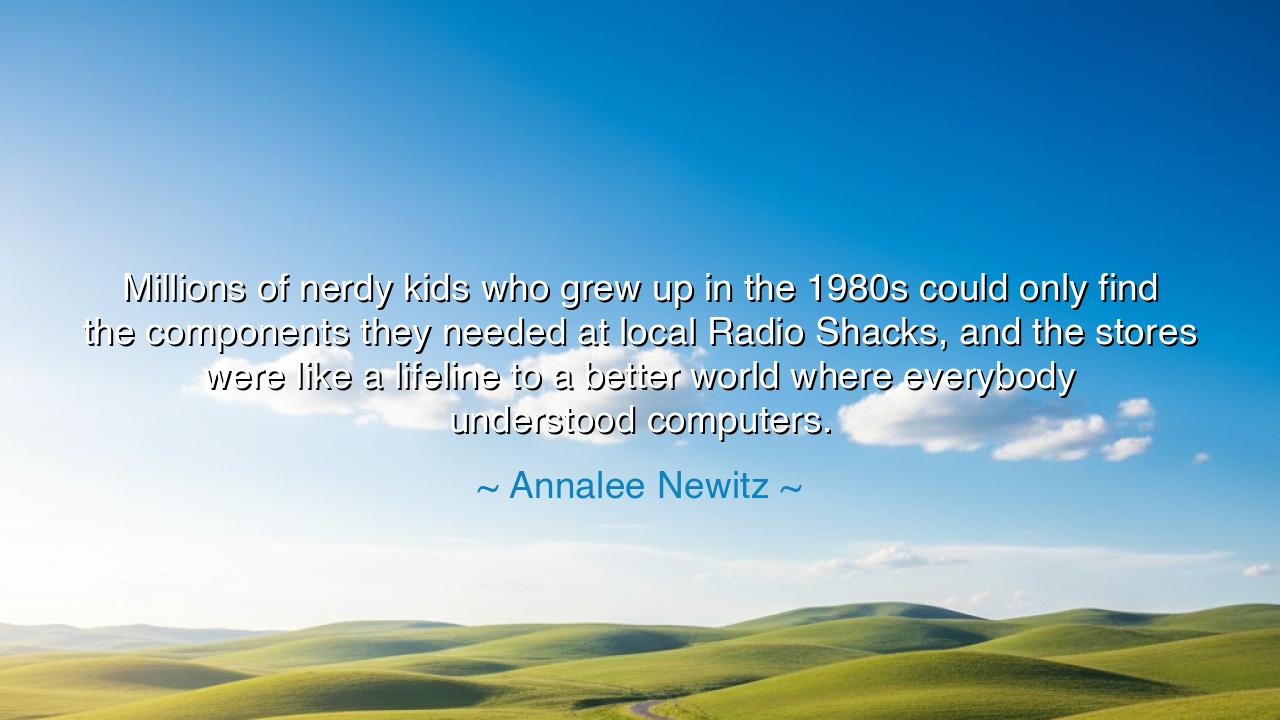
Millions of nerdy kids who grew up in the 1980s could only find
Millions of nerdy kids who grew up in the 1980s could only find the components they needed at local Radio Shacks, and the stores were like a lifeline to a better world where everybody understood computers.






In the quiet recesses of history, there are moments when a single store, a single place, becomes the foundation for a movement, a dream, or the very future itself. Annalee Newitz beautifully captures this truth when she writes, "Millions of nerdy kids who grew up in the 1980s could only find the components they needed at local Radio Shacks, and the stores were like a lifeline to a better world where everybody understood computers." These words evoke an era when technology was still in its infancy, when the world of computers was not yet the dominant force it is today. The Radio Shack, a humble store, served as the gateway for a generation of dreamers, innovators, and creators, offering them the tools to build the future, piece by piece.
To understand the true significance of Newitz’s words, we must first reflect on the world of the 1980s, a time when the digital revolution was just beginning to take shape. The ancients too, had moments in their time when they stood on the precipice of something new—an age of discovery and transformation. The Greeks, for example, had their own "lifeline" in the form of the Agora, a place where knowledge, ideas, and inventions were shared and discussed. It was in these communal spaces that great minds like Archimedes and Socrates could dream of a better world, one where ideas were not constrained by the limits of their time. Similarly, the Radio Shack in the 1980s was the Agora of a new generation—young, eager, and hungry for the possibility of creation and discovery.
Consider the story of Archimedes, the great Greek inventor and mathematician, whose insights in mathematics and mechanics laid the groundwork for many modern technologies. Archimedes was not only a philosopher but a creator, using the tools available to him to push the boundaries of his time. In the same way, the nerdy kids of the 1980s found themselves in the Radio Shack, surrounded by wires, chips, and diodes, crafting and molding their future from the raw materials at their disposal. The Radio Shack served as a modern-day workshop where imagination was brought to life, much as Archimedes had done with his inventions centuries before.
In the realm of Rome, Vitruvius, the great architect, believed that for a building to be truly great, it had to be constructed with both art and science. Vitruvius emphasized the balance between function and beauty, and it was in this spirit that the early engineers and technologists of the 1980s, aided by their Radio Shack lifeline, began to fuse the worlds of mechanical design with the art of computing. These "nerdy kids" were not just assembling computers; they were redefining what it meant to create—by blending hardware and software in ways that had never been seen before. In their hands, computers became more than just machines—they became artifacts of possibility.
The concept of a lifeline—a means by which a person or a generation connects to a greater purpose—is not new. Da Vinci, with his notebooks filled with sketches of flying machines and anatomical studies, was in many ways connected to the idea of the lifeline. His ideas and inventions were born from a place of isolation and dedication, but he too, was seeking to create a better world, one where art and science intersected. For the young inventors in the 1980s, Radio Shack was their lifeline, a space where their ideas, however small, could find their place in the world of electronics, sparking a revolution that would define the next several decades.
The lesson of Newitz’s quote is a profound one for us all. It reminds us that, sometimes, the most transformative ideas do not come from grand institutions or formal education, but from humble beginnings—like the Radio Shack stores where the next generation of innovators found their calling. Just as the ancients created their masterpieces from the resources at hand, so too did these children of the 1980s take the materials available to them and create a world that was once impossible. In our own time, we must recognize that the tools for greatness are not always handed to us—they are often scattered before us, waiting to be assembled and built upon.
So, let us reflect on the example of those early computer pioneers, who, in their nerdy pursuits, sought to create something that would change the world. In every age, there are those who see beyond the limitations of their time, who strive not for what is easy, but for what is possible. In our own lives, we must seek the lifelines that will lead us to greatness. Whether it be through humble means, such as a local shop or a quiet workshop, or through grand visions, we must learn to dream, to create, and to build the future we envision. Let us remember that the tools of innovation are often at our fingertips—waiting for us to seize them and, with a spark of imagination, turn them into something that will inspire generations to come.






AAdministratorAdministrator
Welcome, honored guests. Please leave a comment, we will respond soon